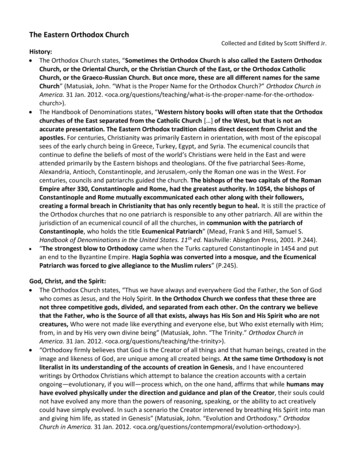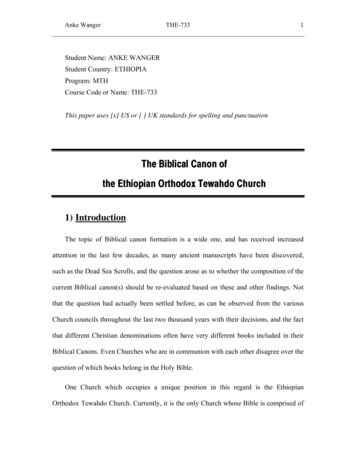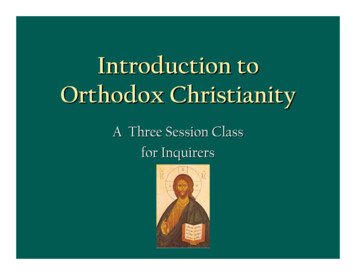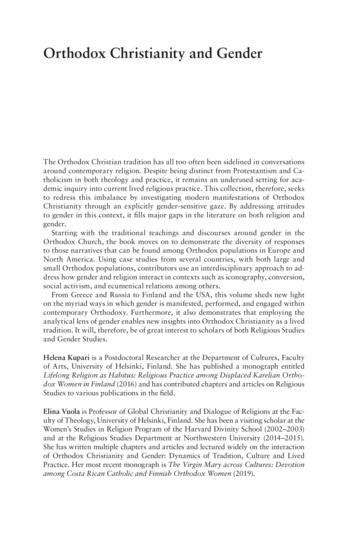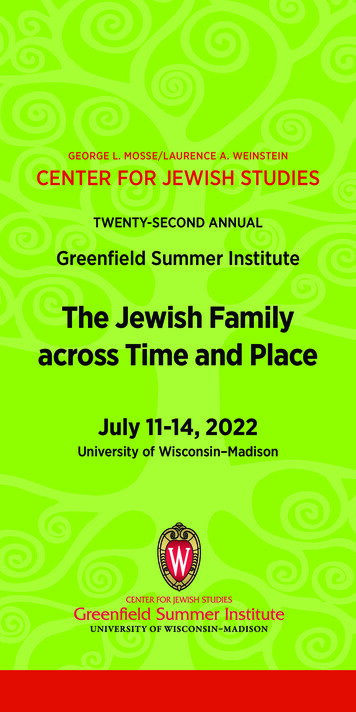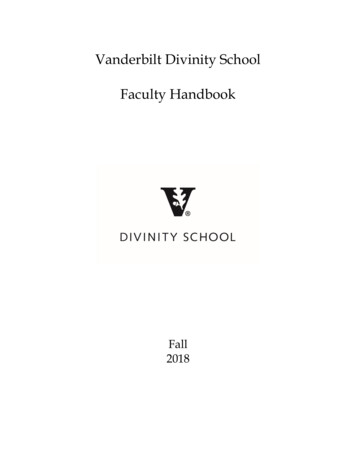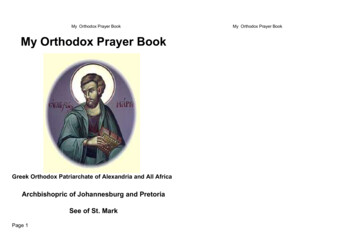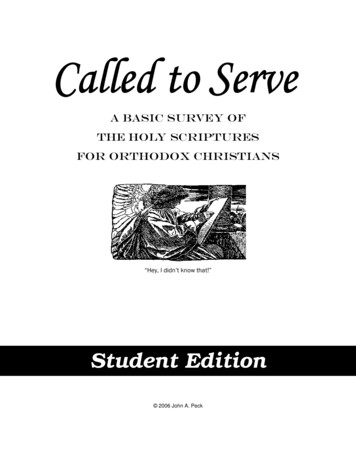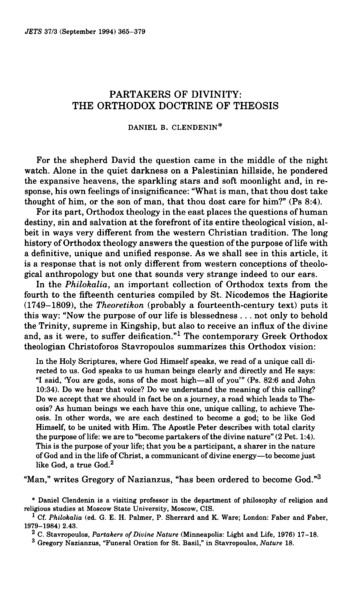
Transcription
JETS 37/3 (September 1994) 365-379PARTAKERS OF DIVINITY:THE ORTHODOX DOCTRINE OF THEOSISDANIEL B. CLENDENIN*For the shepherd David the question came in the middle of the nightwatch. Alone in the quiet darkness on a Palestinian hillside, he ponderedthe expansive heavens, the sparkling s t a r s and soft moonlight and, in response, his own feelings of insignificance: "What is man, t h a t thou dost t a k ethought of him, or the son of man, t h a t thou dost care for him?" (Ps 8:4).For its part, Orthodox theology in the east places the questions of h u m a ndestiny, sin and salvation at the forefront of its entire theological vision, albeit in ways very different from the western Christian tradition. The longhistory of Orthodox theology answers the question of the purpose of life witha definitive, unique and unified response. As we shall see in this article, itis a response t h a t is not only different from western conceptions of theological anthropology but one t h a t sounds very strange indeed to our ears.In the Philokalia, an important collection of Orthodox texts from thefourth to the fifteenth centuries compiled by St. Nicodemos the Hagiorite(1749-1809), the Theoretikon (probably a fourteenth-century text) p u t s itthis way: "Now the purpose of our life is blessedness . . . not only to beholdthe Trinity, supreme in Kingship, but also to receive an influx of the divineand, as it were, to suffer deification." 1 The contemporary Greek Orthodoxtheologian Christoforos Stavropoulos summarizes this Orthodox vision:In the Holy Scriptures, where God Himself speaks, we read of a unique call directed to us. God speaks to us human beings clearly and directly and He says:"I said, Tou are gods, sons of the most high—all of you"' (Ps. 82:6 and John10:34). Do we hear that voice? Do we understand the meaning of this calling?Do we accept that we should in fact be on a journey, a road which leads to Theosis? As human beings we each have this one, unique calling, to achieve Theosis. In other words, we are each destined to become a god; to be like GodHimself, to be united with Him. The Apostle Peter describes with total claritythe purpose of life: we are to "become partakers of the divine nature" (2 Pet. 1:4).This is the purpose of your life; that you be a participant, a sharer in the natureof God and in the life of Christ, a communicant of divine energy—to become justlike God, a true God.2"Man," writes Gregory of Nazianzus, "has been ordered to become God." 3* Daniel Clendenin is a visiting professor in the department of philosophy of religion andreligious studies at Moscow State University, Moscow, CIS.1Cf. Philokalia (éd. G. E. H. Palmer, P. Sherrard and K. Ware; London: Faber and Faber,1979-1984) 2.43.2C. Stavropoulos, Partakers of Divine Nature (Minneapolis: Light and Life, 1976) 17-18.3Gregory Nazianzus, "Funeral Oration for St. Basil," in Stavropoulos, Nature 18.
366JOURNAL OF THE EVANGELICAL THEOLOGICAL SOCIETYThe purpose of this article is to explore the meaning of these astonishingwords. To the nocturnal question about his feelings of insignificance thatDavid asked on that Palestinian hillside we must juxtapose the startlinglybold response to his fellow psalmist Asaph that is invoked by Orthodox theology (Ps 82:6), words that are in fact reiterated by Jesus Christ himself(John 10:34).I. T H E WORK O F CHRIS T EAST AND WESTThe idea of theosis is a distinctive feature that characterizes Orthodoxyand assumes central importance in its overall theological framework. Likea continuous golden thread running throughout the centuries of its ancienttheological tapestry, almost all of the major theologians of the east weavethe threads of this doctrine into the pattern of eastern Christianity. JohnClimacus, for whom the idea of theosis is not a major theme, is perhaps thelone exception to this historical rule, although even in Climacus the themeis not entirely absent. It is not too much to say that the divinization of humanity is the central theme, chief aim, basic purpose, or primary religiousideal of Orthodoxy. Theosis is the ultimate goal toward which all peopleshould strive, 4 "the blessed telos for which all things were made." 5In emphasizing this doctrine Orthodox theologians have intended notonly to focus on what the Theoretikon identifies as the purpose of life. ForOrthodoxy, deification is "the very essence of Christianity," for it describesthe "ineffable descent of God to the ultimate limit of our fallen human condition, even unto death—a descent of God which opens to men a path of ascent, the unlimited vistas of the union of created beings with the Divinity." 6To paraphrase Athanasius, when God descended, assumed humanity, andwas "incarnated," he opened the way for people to ascend to him, assumedivinity, and become "in!godded." In its very definition of the gospel, then,eastern Christianity presupposes the idea of deification. Even when theterm is not explicitly mentioned it is implicitly present "as the content ofthe salvation proclaimed by the gospel."7Except for the important work by the Catholic scholar J. Gros 8 and occasional references to the theme, western theologians in general and Protestants in particular have given only scant attention to the centralimportance of theosis in Orthodox thought. Nor do they address the doctrineas an important Biblical category in its own right. On the other hand, asearly as Gregory Palamas' fourteenth!century work entitled On Divine andDeifying Participation, Orthodox thinkers have systematically analyzed thedoctrine at length. More important still, eastern treatments of the doctrine4G Mantzaridis , The Deification of Man (Crestwood St Vladimir's Seminary, 1984) 12, 129Gregory N a z i a n z u s To Thallasius60, cf Ρ Chrestou, Partakers of God (Brookhne HolyCross Orthodox, 1984) 36, cf 16!17, 616V Lossky, In the Image and Likeness of God (Crestwood St Vladimir's Seminary, 1985) 977J Pelikan, The Spirit of Eastern Christianity (Chicago University of Chicago, 1974) 11, cf 46See Mantzaridis , Deification 135
PARTAKERS OF DIVINITY: THE ORTHODOX DOCTRINE OF THEOSIS367of salvation generally construe the dilemma of humanity and the responseof God in the work of Christ from a perspective that is very different fromthat of the west.Orthodox theologians contend that in the west the doctrines of sin andsalvation have been unduly dominated by legal, juridical and forensic categories. These categories, they insist, are not only overly negative and aliento the spirit of eastern Christianity but also, when allowed to dominate,are actual distortions of the Biblical message. 9 Ernst Benz suggests thatthis legal framework predominates in western thinking (both Catholic andProtestant). He notes how the apostle Paul frames his epistle to the Romans in terms of divine law and justice, categories that are perhaps takenfrom Roman civil law, and that his idea of justification by faith answers thequestion of how guilty people can stand before a just God. In its doctrinesof penance, indulgences, concept of the Church, role of the priest, andcanon law, Benz suggests that the Catholic Church especially developed inthis legalistic direction. 10 This accent on legal concepts, in contrast to theideas of mystical union perpetuated in the east, is thus seen by Orthodoxyas the "real issue that unites the West theologically [that is, both Catholicsand Protestants] and divides it from the East." 11Tertullian (c. 170-220), who may have been trained as a lawyer and wasthe first major theologian to write in Latin, is usually credited as the firstto interpret the work of Christ in juridical categories, but it is Augustine(354-430) and Anselm of Cantebury (1033-1109) who developed forensicconcepts fully and invested them with full force. Meyendorff has suggestedthat the enormous influence of Augustinian legal categories in the west,and Augustine's lack of influence in the east (where the work of Christ wasunderstood in terms of theosis), is one of the major theological factors thatcaused the eastern and western churches to drift apart. 12 In his epochmaking work Cur Deus Homo, a book that influenced almost all subsequenttreatments of the work of Christ, Anselm argued that the sin of man hadoffended the majesty and honor of God and that the justice of God could onlybe served by making a "satisfaction" or just payment of the penalty. Withonly a little work we could adduce further examples of the predominanceof juridical categories in western soteriology. In evangelical theology especially, for example, writers like James Packer and John Stott interpret thework of Christ primarily in terms of penal substitution. 13A good illustration of this basic difference between the east and the westis the doctrine of justification by faith, so prevalent in the west but almosttotally absent in eastern thought. Martin Luther argued that Christianity9Lossky, Image, chap. 5.E. Benz, The Eastern Orthodox Church (Garden City: Doubleday, 1963) 4 3 - 4 7 . Here I amfollowing the fine s u m m a r y by J. Stamoolis, Eastern Orthodox Mission Theology Today (Maryknoll: Orbis, 1986) 7 - 1 1 .Stamoolis, Mission 7.12J. Meyendorff, Byzantine Theology (New York: Fordham, 1979) 143.13Cf. J. I. Packer, "What Did the Cross Achieve? The Logic of Penal Substitution," TynB 25(1974) 3 - 4 5 ; J. Stott, The Cross of Christ (Downers Grove: InterVarsity, 1987).10
368JOURNAL OF THE EVANGELICAL THEOLOGICAL SOCIETYwould stand or fall with this doctrine, and in his treatise entitled Two Typesof Righteousness he developed the idea of our external, passive and alienrighteousness in Christ, that God declares sinners righteous based on theperfect righteousness of Christ that is credited to the believer—certainly anidea quite different from notions of mystical union with Christ. Calvin described justification by faith as the "hinge on which all true religion turned,"and in his precise definition of the doctrine he compares it to an acquittalin the courts of divine justice: "Just as a man, deemed innocent by an impartial judge, is said to be justified, so a sinner is said to be justified by Godwhen he asserts his righteousness." 14 In the history of Orthodox theology,on the other hand, it is startling to observe the near total absence of anymention of the idea of justification by faith. Justification by faith has received short shrift in Orthodoxy, and the most important text of Orthodoxtheology, John of Damascus' The Orthodox Faith, never even mentions theidea. 15We have here a genuine difference of perspective between the east andthe west. But if we left the matter at that, we would be guilty of misconstruing the issue. That is, we must add a caveat of sorts to this general theological historiography. Three qualifications are worth noting.First, if legal categories such as justification by faith are categories thatPaul himself uses, as Stamoolis, Lossky, Benz and other Orthodox theologians acknowledge, then this way of interpreting the work of Christ ishardly a distortion or unduly negative. Rather, the idea of justification andlegal categories are eminently Biblical.Second, the real issue here seems to be one of a difference of emphasis—the east emphasizing mystical union through theosis, the west emphasizing juridical categories. No necessity forces us to choose between the twoor to see them as mutually exclusive categories that are contradictory.Rather, they and a host of other NT salvation motifs besides (adoption, reconciliation, redemption, ransom, sacrifice, forgiveness, Christus victor, propitiation, deliverance) are complementary. We need to affirm them all inorder to begin to understand the wonder of God's salvation in Christ.Third, the above historical generalizations are not as neat and clean assome would have it. Although the west does not embrace the explicit notionof theosis in any sustained or major way, deification is not entirely absentfrom its tradition. "God received a body and a soul," writes Augustine, "inorder that the body and soul of man may be blessed: the soul with his divinity and the body with his humanity." 16 Pelikan has ferreted out references to theosis in several Latin medieval theologians. The canon lawyerand theologian Alger of Liege (died 1131/32) and German exegete Rupert ofDeutz (1075-1129) refer to the humanity of Christ as "deified man." Catholic reformer Peter Damián (1007-72) cites 2 Pet 1:4 and notes that Christ"ascended in order to make us participants in his divinity." Bernard of141516J Calvin, Institutes 3 112A notable exception is the Confession by Cyril Lucanus (1572-1638), articles 9 and 13Augustine Enchiridion 26
PARTAKERS OF DIVINITY: THE ORTHODOX DOCTRINE OF THEOSIS369Clairvaux (1090!1153) writes of filling ourselves with God. Nygren seesthe doctrine in some Reformation people. 1 7 Further, the west has a well!developed concept of the Pauline idea of union with Christ. In the openingpages of Book 3 of his Institutes Calvin, for example, before he raises theissue of justification by faith, speaks of believers being engrafted into orbonded with Christ through the "secret energy of the Holy Spirit."Conversely, when describing our salvation in Christ, theologians of theeast incorporate other Biblical motifs in addition to theosis. Athanasius, thepreeminent proponent of theosis for Orthodoxy, is a case in point. He usesa host of Biblical motifs to describe the work of Christ, including substitutionary or vicarious atonement, the payment of a debt, the conquest of deathand the devil, ransom, and sacrifice. In fact in the locus classicus of theosisAthanasius exclaimed that the work of Christ is so multifaceted that tryingto number the many and various benefits of Christ is like trying to gaze atthe open sea and count the endless waves of the ocean: "Even so, when onewants to take in all the achievements of Christ in the body, one cannot doso, even by reckoning them up, for the things that transcend one's thoughtare always more than those one thinks that one has grasped." 1 8 We can say,then, that in addition to theosis eastern theologians affirm any number ofBiblical metaphors for salvation, including juridical ones. They acknowledge that the work of Christ cannot be reduced to any single metaphor andthat while legal metaphors are truly Pauline and should be affirmed theyshould not be allowed to dominate but rather be "relocated" among the hostof other Biblical images. 1 9In their better moments both western and Orthodox theologians acknowledge this point, that the Biblical material presents the work of Christfrom a number of different perspectives and that all of them are necessary20for a complete understanding of our salvation in Christ. Nevertheless adifference of emphasis is still a genuine difference. The west lacks any developed notion of theosis and tends to express the idea of salvation in juridical categories. The eastern Church neglects the concept of justificationin favor of deification, a theme that it discovers throughout the Bible andrepeats down through the centuries.II. BIBLICAL AND HISTORICAL WITNESSESThe Bible speaks extensively about theosis, according to the Orthodoxtheologians, and thus so must we. The two most direct texts are 2 Pet 1:4and Ps 82:6 ( John 10:34!35). If it be objected that these texts are taken17J Pelikan, The Growth of Medieval Theology (Chicago University of Chicago, 1978) 152,Imago Dei (Princeton Princeton University, 1990) 141Athanasius On the Incarnation 8 5419V Lossky, Orthodox Theology An Introduction (Crestwood St Vladimir's Seminary, 1989)111 Cf also J Karmins, Synopsis of the Dogmatic Theology of the Orthodox Catholic Church(Scranton Christian Orthodox Edition, 1973) 70 η 3320Lossky, Image 100, Chrestou, Partakers 42, Mantzaridis, Deification 27, Stamoolis, Mission 9
370JOURNAL OF THE EVANGELICAL THEOLOGICAL SOCIETYout of context, or that finding the doctrine in an array of Biblical texts is unconvincing, Orthodox theologians would care little. True exegesis seeks toperceive the hidden meaning of Scripture that lies beyond or beneath theliteral words of the text. Sticking to the "mere letter" of Scripture onlyproves one's attachment to the senses and the flesh,21 and although carelessallegorization can "kill the Scriptures" the true exegete always seeks a"spiritual interpretation" of God's Word.22 Further, since the tradition ofthe Church fathers speaks so definitively about the matter, the Biblical propriety of the doctrine of theosis is for Orthodoxy beyond debate. In fact eastern theologians claim an extensive litany of Biblical witnesses to thedoctrine of deification. They consider humanity's organic union with God tobe a constant theme in both Paul and John. Far from being unscriptural,according to Orthodoxy theosis claims a "solid biblical basis" that goes farbeyond the two explicit texts in 2 Pet 1:4 and John 10:34-35. 23Moses, who encountered God in the burning bush and the smoky darkness of Mount Sinai and was transfigured so that his face shone (Exod34:30), "became a god to Pharaoh" (Exod 7:1).24 The transfiguration of Peter on Mount Tabor (Matt 17:4) parallels Moses' transfiguration on Sinaias a paradigm for us today whereby we "participate in the divine brightness." 25 Two oft-repeated texts are 2 Cor 8:9 and Heb 4:15. Commenting onthese texts, Mark the Ascetic (early fifth century) writes that Christ "became what we are, so that we might become what He is. The Logos becameman, so that man might become Logos. Being rich, He became poor for oursakes, so that through His poverty we might become rich. In His great lovefor man He became like us, so that through every virtue we might becomelike Him."26 The Johannine corpus is an especially rich witness to theosis(John 3:8; 14:21-23; 15:4-8; 17:21-23; 1 John 3:2; 4:12). Referring to Johnthe Theologian and his many references to our union with God, Peter ofDamaskos invokes the authority of Christ himself, writing that we become"gods by adoption through grace" and, having become dispassionate, "wehave God within ourselves—as Christ Himself has told us." 27 Both Macarios of Egypt and Chrysostom appeal to the marriage analogy in 1 Cor 6:17to refer to our spiritual marriage in which "the soul is joined to God in anineffable union." 28 According to Ilias the Presbyter (c. eleventh or twelfthcentury), it is when we attain divine likeness through theosis that we transcend the differences between male and female (Gal 3:28).29Máximos, Various Texts on Theology 4 76, cf Philokalia 2 254P e t e r of Damaskos, Book 2, Twenty-Four Discourses 12, 23, Philokalia 3 144,23Τ Ware, The Orthodox Church (London Penguin, 1964) 236!23 72 4St Hesychios t h e Priest, On Watchfulness and Holiness 139, cf Philokalia 15Macarios of Philadelphia, in Nicodemos of t h e Holy Mountain, A HandbookCounsel (New York P a u h s t , 1989) 2242 6M a r k t h e Ascetic, Letter to Nicolas, in Philokalia 1 1552 7P e t e r of Damaskos, Treasury of Divine Knowledge, Book 1, Philokalia 3 79,Handbook 1862 8Chrysostom Homily 20 on Ephesians 5 22!33, Macarios Macarían HomiliesPhilokalia 3 314, 33029Ilias the Presbyter, Gnomic Anthology 3 25, cf Philokalia 3 5022248, 267186of SpiritualNicodemos,4 67, 6 124,
PARTAKERS OF DIVINITY: THE ORTHODOX DOCTRINE OF THEOSIS371The examples of Máximos the Confessor and Symeon the New Theologian are especially instructive on this point, for they illustrate the depth andbreadth of the Orthodox confidence t h a t the idea of theosis is an eminentlyBiblical theme. Máximos discovers the idea of theosis nearly everywhere.The purpose of the Lord's Prayer was to point to the mystery of deification.Baptism was "in the name of the life-giving and deifying Trinity." When theguests at the wedding in Cana of Galilee . . . said that their host had "kept thegood wine until now," they were referring to the Word of God, saved for the last,by which men were made divine. When, in the Epistles of the same ApostleJohn, "the Theologian," it was said that "it does not yet appear what we shallbe," this was a reference to "the future deification of those who have now beenmade children of God." When the Apostle Paul spoke of "the riches" of thesaints, this, too, meant deification.30In addition to the passages already mentioned, Symeon the New Theologianappeals to a broad a r r a y of other Biblical texts when he expounds the doctrine of theosis (1 Cor 6:15; Col 3:1; Titus 2:13). 3 1To these Biblical texts we can add the historical witness of Orthodoxy'ssacramental life and theological literature down through the centuries, bothof which repeatedly define salvation as divinization. Theosis is "echoed bythe fathers and the theologians of every age." 3 2 In addition to the dozen orso representatives already noted we can briefly mention other important historical witnesses to deification, t h u s giving us a sense of the n e ar ubiquityof the doctrine in eastern theology.The earliest references to theosis occur in Irenaeu s (c. 175) and Origen(185-254), both of whom anticipate the A t h a n a s i a n epigram with nearly theexact words two centuries earlier. "If the Word is made man," writes Irenaeus, "it is t h a t men might become gods." According to Origen, when wetranscend the material realm the contemplation of God is brought to "itsproper fulfillment," which fulfillment is for the spirit "to be deified by t h a twhich it contemplates." 3 3The Cappadocian fathers all continue the theme. Basil insists t h a t "thegoal of our calling is to become like God." He attributes the experience of theosis to the Holy Spirit who, "being God by n a t u r e . . . , deifies by grace thosewho still belong to a n a t u r e subject to change." According to Gregory ofNyssa "God united Himself to our n a t u r e in order t h a t our n a t u r e might bemade divine through union with God." 34 Gregory of Nazianzus echoes theAthanasian epigram, t h a t as God became incarnate, m a n became endivinized, and t h a t to the extent t h a t Christ became a real man , so we becomereal gods. 3 530Pelikan, Spirit 10.Symeon the New Theologian, The Discourses (New York: Paulist, 1980) 207, 336, 361.3V. Lossky, The Mystical Theology of the Eastern Church (Crestwood: St. Vladimir's Seminary, 1976) 134.33See V. Lossky, The Vision of God (Crestwood: St. Vladimir's Seminary, 1973) 42, 61-62.34Basil On the Holy Spirit 1.2; Gregory of Nyssa Oratio Catechetica 25 in Lossky, Vision 80;Gregory Nazianzus Poem, dogma 10.5-9 in Lossky, Mystical 134; Letter to Cledonius inKarmiris, Synopsis 70 n. 31.35Gregory Nazianzus Epistle 101; Logos 29.19; cf. Chrestou, Partakers 40, 51.31
372JOURNAL OF THE EVANGELICAL THEOLOGICAL SOCIETYCyril of Alexandria (370!444), one of the most important theologians ofthe fifth century, comments on 2 Pet 1:4 to note that we are all called toparticipate in divinity. Although Jesus Christ alone is by nature God, allpeople are called to become God "by participation." In such participationwe become likenesses of Christ and perfect images of God the Father. 3 6 Inthe middle ages John of Damascus insists that people are created for deification and that the work of Christ insures that we might have his imagerestored in us and so become "partakers of Divinity." 37 According to Psel!lus (died c. 1078), professor at Constantinople, the likeness of the soul toGod ultimately means its "ability to make men divine." Like many beforehim Psellus invokes the standard formula, that God became man that man38might become God. To reference an Orthodox saint who not only expounded the doctrine of theosis but who in fact experienced its full effects,there is the moving account of the Russian monk St. Seraphim of Sarov39(1759!1833 ) by his disciple Nicholas Motovilov.That the liturgical life of Orthodoxy expresses the doctrine of theosis isanother testimony to its importance in the eastern tradition. Not only doctrine and belief (lex credendi) but also worship and prayer (lex orandi) proclaim the ideal of deification. In the Canon for Matins of Holy Thursday theChurch confesses in its worship: "In my kingdom, said Christ, I shall beGod with you as gods." 40 The ancient Liturgy of St. James (c. 450), extantin both Greek and Syriac, proclaims: "Thou hast united, O Lord, Thy divinity with our humanity and our humanity with Thy divinity, Thy life withour mortality and our mortality with Thy life; Thou hast received what wasours and hast given unto us what was Thine, for the life and salvation ofour souls, praise be to Thee in eternity." 4 1The hymnology of the fourth!century Christian poet St. Ephrem the Syrian adds its choruses to the liturgy. Since Ephrem wrote in Syriac and wasprobably ignorant of Greek, his hymns are significant exceptions to thecommon charge that the Orthodox doctrine of theosis is only a pale imitation of Hellenistic philosophy. According to Ephrem, if Adam and Eve hadnot transgressed the divine command "they would have acquired divinity inhumanity" (Commentary on Genesis). In a Nisibene hymn he writes: "TheMost High knew that Adam wanted to become a god, so He sent His Sonwho put him on in order to grant him his desire." In Ephrem's Hymns onVirginity we read: "Divinity flew down and descended to raise and draw uphumanity. The Son has made beautiful the servant's deformity, and he hasbecome a god, just as he desired." And if Athanasius is typically creditedwith the definitive epigram of theosis, Ephrem is no less aphoristic. In hisHymn on Faith he puts the whole matter succinctly enough: "He gave us363738See Lossky, Vision 98John of Damascus, The Orthodox Faith 4 4, 2 12, 3 18, 20Psellus Omnifarious Doctrine 71, Oration on the Salutation to Mary 2, cf Pelikan, Spirit24739Cf Ware, Orthodox 130!132Ode 4, Tropanon 3, cf Ware, Orthodox 236Cf Ν Arseniev, Mysticism and the Eastern Church (Crestwood St Vladimir's Seminary,1979) 1484041
PARTAKERS OF DIVINITY: THE ORTHODOX DOCTRINE OF THEOSIS373divinity, we gave Him humanity." 4 2 Later we will see t h a t for m a n y of theeastern theologians the very m e a n s of deification are found in the sacramental life of the Church.III. DEIFICATION DEFINEDBut what, exactly, does it mean to be "divinized" or to "become god"? In attempting to define theosis, Orthodoxy would have us begin with two cautions.First, remembering its predilection for apophatic theology we m u s t not"seek w h a t is too difficult or investigate w h a t is beyond our power." Insteadwe can only "reflect upon w h a t h a s been assigned to us, for [we] do not needwhat is hidden" (Sir 3:21-22). Because theosis is ultimately a mystery weneed to use discretion when trying to define it. In some sense theosis defiesanalysis.Deification, insists St. Macarios of Egypt (c. 300-390), is "subtle and profound." 43 P a l a m a s , who devoted an entire treatise to the subject, is nevertheless reluctant to describe the indescribable:Although we have written at length about stillness . we have never dared towrite about deification But now, since there is need to speak, we will speak,reverently, with the Lord's grace, though to describe it is beyond our skill. Foreven when spoken of, deification remains unutterable: as the Fathers say, itcan be identified only by those who have been blessed with it. 44Union with the divine, asserts Máximos the Confessor, "in the n a t u r e ofthings, cannot be perceived, conceived or expressed." 4 5Second, all of the eastern theologians, both ancient and modern, uniformlyand categorically repudiate any hint of pantheism. Whatever it means to "become god," the essence of h u m a n n a t u r e is not lost. In this sense we can saythat h u m a n theosis is a relative r a t h e r t h a n an absolute transformation.There is a real and genuine union of the believer with God, but it is not a literal fusion or confusion in which the integrity of h u m a n n a t u r e is compromised. Orthodoxy consistently rejects the idea t h a t h u m a n s participate in theessence or n a t u r e of God. Rather, we remain distinctly h u m a n by n a t u r e butparticipate in God by the divine energies or grace. At no point, even whendeified, is our humanity diminished or destroyed.Thus Máximos writes t h a t "all t h a t God is, except for an identity in ousia, one becomes when one is deified by grace." When the Logos became m a nand deified us, he changed h u m a n n a t u r e "not in its essential n a t u r e b u t inits quality." 4 6 In his definition of theosis Anastasios Sinaites insists uponthe same distinction: "Theosis is the elevation to w h a t is better, but not theSt Ephrem the Syrian, Hymns on Paradise (Crestwood St Vladimir's Seminary, 1990)72-743Macarios Macarían Homilies 4 67, cf Philokalia 3 31444G Palamas, Triads Defense of the Holy Hesychasts (New York Pauhst, η d ) 3 1 32 CfMantzaridis, Deification 1275Máximos, Various Texts on Theology 4 19, cf Philokalia 2 24046Máximos, Book of Ambiguities 41, cf Pelikan, Spirit 267 (italics mine), Máximos, VariousTexts on Theology 2 26, cf Philokalia 2 193
374JOURNAL OF THE EVANGELICAL THEOLOGICAL SOCIETYreduction of our nature to something less, nor is it an essential change ofour human nature. . . . That which is of God is that which has been lifted upto a greater glory, without its own nature being changed."47 John of Damascus distinguished between "man becoming deified in the way of participating in the Divine Glory, and not in that of a change into a DivineBeing."48 St. Macarios likewise is careful to protect the creature-Creatordistinction, writing that even when we are deified by grace "Peter is Peter,Paul is Paul, Philip is Philip. Each one retains his own nature and personalidentity, but they are all filled with the Holy Spirit." 49IV. SYNONYMS AND ANALOGIESKeeping these two disclaimers in mind, we can further our definition oftheosis by looking at the various synonyms and analogies or metaphors thatOrthodoxy uses to explain the mystery of salvation. Theosis, according to thevoc
* Daniel Clendenin is a visiting professor in the department of philosophy of religion and religious studies at Moscow State University, Moscow, CIS. 1 Cf .Philokalia (éd G E H Palmer, P Sherrar d an K Ware; London: Faber an Faber, 1979-1984) 2.43. 2 C. Stavropoulos , Partakers of Divine Nature (Minneapolis: Light and Life 1976) 17-18.


